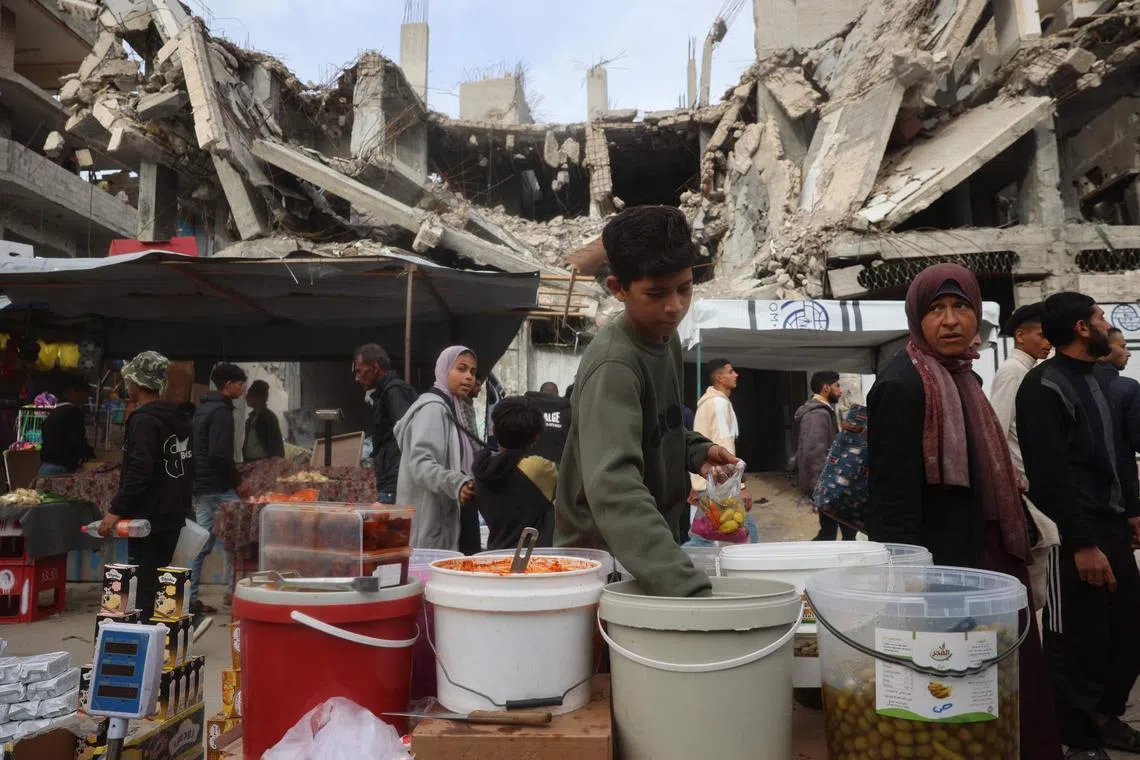Gazans fear shortages, price hikes after Israel blocks aid
Sign up now: Get ST's newsletters delivered to your inbox

Prices for basic goods soared despite attempts by the authorities to keep them stable, shoppers and aid workers told AFP.
PHOTO: AFP
Follow topic:
GAZA CITY, Palestinian Territories - Palestinians living in war-ravaged Gaza say they fear food shortages and price hikes after Israel halted the entry of aid into the territory
The effect of the Israeli announcement on March 2 was immediate, and sent ripples through markets across the Gaza Strip.
Prices for basic goods soared despite attempts by the authorities to keep them stable, said shoppers and aid workers.
“There is a lot of fear. Today there are a lot of people buying food supplies and prices have risen a lot,” Mr Belal al-Helou said at a crowded street market in Gaza City.
As long as Gaza’s crossings are closed, “the prices will rise and increase even more”, Mr Helou told AFP on March 2.
“Today, a kilo of sugar costs 10 shekels or 12 shekels,” he said – roughly US$3 (S$4), and more than twice the price before the war.
“Prices are rising and people are panicking about food supplies.”
Another shopper, Mr Adly al-Ghandour, said prices had risen “80 per cent so far, and if the crossing remains closed, prices will rise 200 per cent”.
Around them, stalls were still well stocked from the first phase of the ceasefire, which began on Jan 19 and enabled the entry of vital food, shelter and medical assistance after more than 15 months of war triggered by Hamas’ Oct 7, 2023 attack on Israel.
Shopkeepers also sold decorations such as small lanterns and signs reading “happy Ramadan”, while bakers made hundreds of pancakes to be used in qatayef, a pastry filled with cream and nuts typically eaten during the Muslim holy month that started on March 1 in Gaza.
‘No panacea’
Ms Caroline Seguin, emergency coordinator for Doctors Without Borders in Gaza, said trucks that were supposed to arrive on March 2 were turned back full.
“We were able to get a few trucks in during the six weeks of ceasefire, but it’s no panacea” for the humanitarian situation, Ms Seguin told AFP on March 3.
Although the organisation’s stocks of medical equipment were somewhat replenished during the first phase, other items such as generators and supplies for water desalination were blocked because Israel labels them “dual use” items that could be adapted by militants to make weapons.
Ms Seguin added that humanitarian aid “shouldn’t be a part of ceasefire negotiations while Gaza’s population needs assistance”.
In the northern city of Jabalia, displaced Palestinians who returned after the start of the ceasefire stay in tents erected by charity organisations on a patch of cleared land, surrounded by bombed-out buildings, AFP journalists saw.
Senior Hamas official Osama Hamadan said on March 3 that only 15 of the 65,000 mobile homes that were due to enter Gaza during the ceasefire had actually made it in.
Israel’s agency in charge of regulating the aid flow in Gaza did not respond to AFP when asked about the figure.
‘Completely demoralised’
Ms Seguin said she had noted an instant price increase in Gaza markets, including for eggs, whose price went up 150 per cent. But above all, the aid suspension was a hard blow to Gazans’ morale.
“They’re completely demoralised,” she said of her Gazan colleagues who had held on through 15 months of fighting.
“They’re afraid of a return to the November-December situation... when you couldn’t find bread and there wasn’t any meat in town.”
Meanwhile, Israeli government spokesman David Mencer accused Hamas of hoarding supplies and claimed the Palestinian Islamist movement had “enough food to fuel an obesity epidemic”.
“The supplies are there but Hamas doesn’t share,” Mr Mencer told journalists.
Talks between Israel and Hamas for the continuation of the truce have hit an impasse in recent days.
Israel is pressing to extend the ceasefire’s first phase, while Hamas favours moving on to phase two of the deal, which envisions an Israeli withdrawal from Gaza and a more permanent end to the war. AFP

